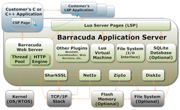Real Time Logic hat einen interessanten Blogpost auf Linkedin veröffentlicht:
Starting in 2025, manually updating certificates for Embedded Web Servers (Intranet Web Servers) will become increasingly impractical. The industry is shifting toward significantly shorter certificate lifespans, driven by the need for enhanced security and reduced vulnerabilities.
Historically, SSL/TLS certificates had validity periods extending up to several years. However, major players like Google and Apple have been pushing for much shorter certificate lifespans to stay ahead of evolving threats. Google advocates for 90-day certificates, while Apple has recently proposed lifespans as short as 47 days. Adding to this shift, Let’s Encrypt plans to introduce six-day certificates starting in 2025. These changes mean certificates will need to be renewed at least every three days, and to minimize risks, daily renewals might become the norm.
Manually managing renewals at such a high frequency is not sustainable. It would be time-consuming, prone to errors, and could lead to security lapses if a certificate expires unnoticed. This is particularly true for embedded web servers, which often have limited administrative oversight. The solution lies in automated certificate management systems. Services like SharkTrust™ automate the entire lifecycle of certificates, including issuance, renewal, and installation, ensuring security and compliance without manual intervention.
Some may consider bypassing these changes by creating their own private-public key infrastructure (PKI) with certificates that have longer lifespans. However, this approach is fundamentally flawed. Modern browsers enforce certificate lifetime limitations as a built-in security feature. Certificates with longer lifespans, even if issued by a private PKI, will not be trusted by browsers, rendering them ineffective for web-based applications. This means any attempts to circumvent the shorter lifespans will fail in practice, as the browsers themselves are the ultimate gatekeepers of trust.
In conclusion, as the industry transitions to shorter certificate lifespans in 2025, embracing automated certificate management is no longer optional - it’s essential. Automation ensures that embedded web servers remain secure and compliant without the risk of human error or the need for constant oversight. Attempting to create a private PKI with extended certificate lifespans is not a viable solution, as browser-enforced limitations render such certificates untrustworthy. Adopting solutions like SharkTrust™ is the most practical and secure path forward in this new era of certificate management.
Hier finden Sie weiterführende Informationen direkt bei RTL

 Das Plug-In basierte Barracuda Embedded Web Server SDK vereinfacht und
Das Plug-In basierte Barracuda Embedded Web Server SDK vereinfacht und  SharkSSL ist sehr Speicherplatzsparend, das Transport Agnostische API macht die Verwendung in jedem embedded System möglich, egal ob 8-Bit oder 64-Bit Mikrocontroller werwendet werden.
SharkSSL ist sehr Speicherplatzsparend, das Transport Agnostische API macht die Verwendung in jedem embedded System möglich, egal ob 8-Bit oder 64-Bit Mikrocontroller werwendet werden.